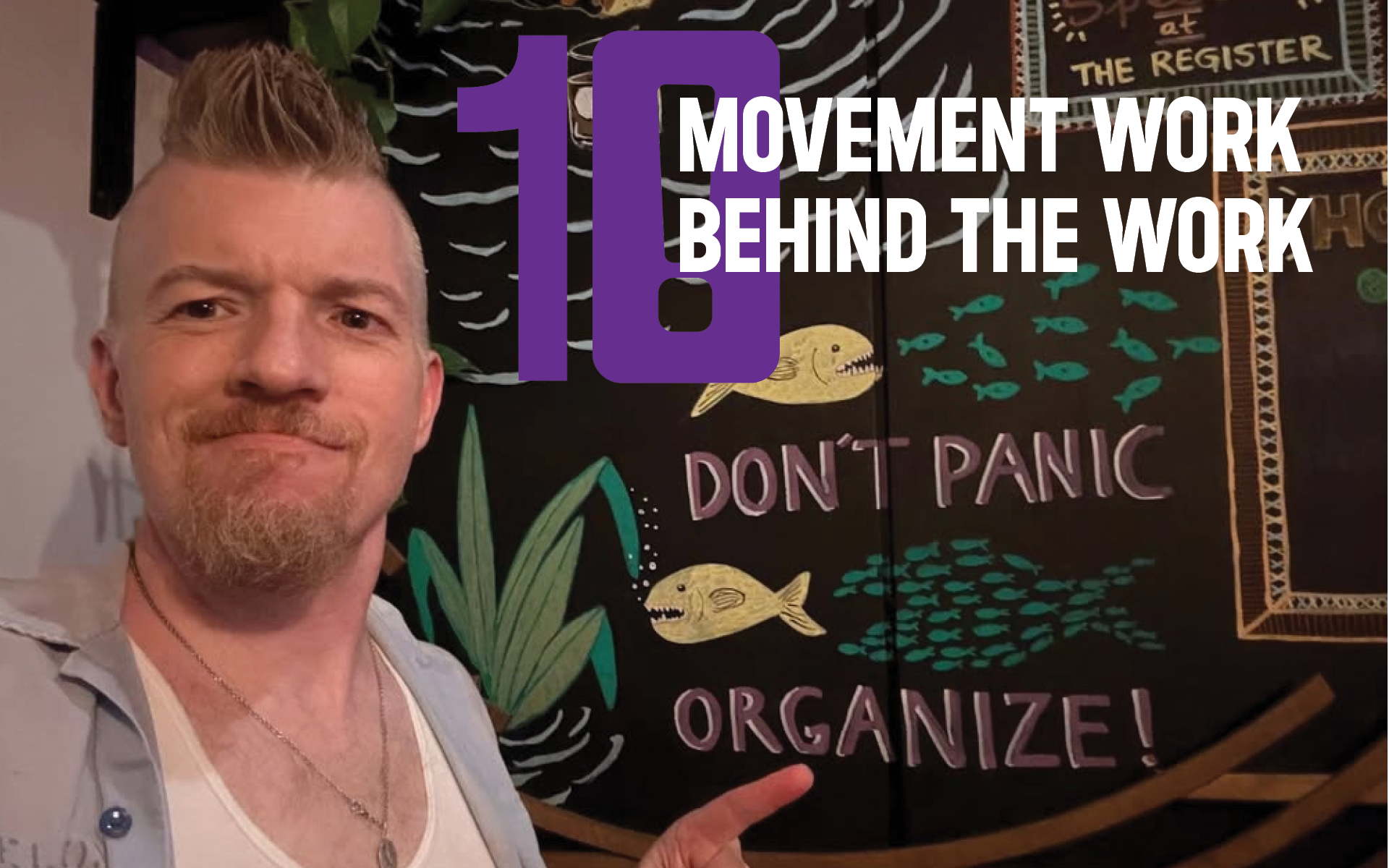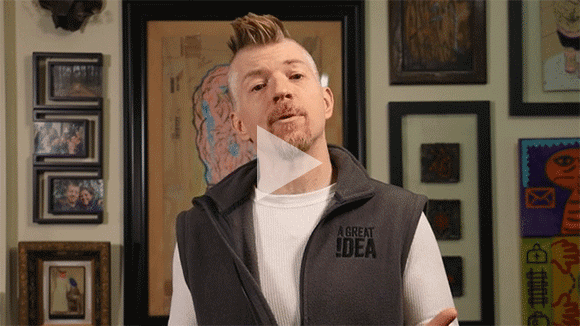The Movement Work Behind the Work
The Personal Advocacy and Values Fueling Our Great Ideas

For the ten years we’ve spent together, A Great Idea has brought creative solutions to partners working from their mission and values. But the truth is, the work that we find most impactful isn’t always the kind we can showcase in portfolios or case studies.
Each member of our team is deeply impacted by the personal projects and collective advocacy they pour into. They’re issues we care about so deeply they follow us everywhere and shape the way we show up to projects.
As we celebrate our company’s tenth anniversary, we’re making space for that side of the story. The passions and perspectives of AGI’s team don’t always fit neatly into “the brand,” but are central to who we are.
From writing projects to community organizing, here’s what we’re working on behind the scenes and why it matters:
Shane:
Over the last year, I have taken a role with my county’s Human Relations Commission. These don’t exist in every state, and my state (North Carolina) has them in several but not all counties. I joined because it is something anyone can do to show up voluntarily to advocate for and respond to their neighbors, and in my county, there is a long history of commitment to responding to prejudice through protections that the commission has at its core to preserve. I always thought of myself as an activist, and as I have gotten older, I also recognize that these civic roles are also important and often go unfilled in many parts of the nation. So, I am learning, grateful to be in community with other neighbors as well as those whose county positions serve to identify, elevate, and empower others to be seen and valued.
Yet, in this moment, every HRC in the state is being threatened while others have already been disbanded or reduced. We now risk being outlawed by a legislative body that appears uninterested or even provoked to silence a nonpartisan volunteer body of community members who uphold and advocate for these values. So, in my personal life, this is something I can do in addition to AGI’s service to our partners and our commitment to contribution and advancement of inclusive action towards equity, dignity, and freedom for all.
Daniel:
The struggle for Palestinian liberation, particularly in the context of the ongoing genocide, is to me both the intersection of all social justice struggles and humanity’s moral compass. What do I mean by this? The latter might be simply posed with the question: do you support genocide? But nearly three years into the systematic extermination of Palestinians, even a “no” lands us in fraught ethical terrain as it appears the true moral hinge is epitomized by the question: ”what are you willing to do about it?” So far, the expanse of global silence and inaction–that is, as complicity–makes this the world’s genocide on Palestinians. As for Palestinian liberation being the intersection of all social justice struggles: first and foremost, it stands in resistance to imperialism and colonialism, which in turn is a resistance to racism (apartheid), land domination (land theft), climate catastrophe (environmental destruction), and extractive economies (natural resource theft). When physical annihilation is actually one’s daily and primary concern, what are human rights to the dehumanized? What is the right to healthcare when all of your hospitals are bombed, medicines denied, and medical workers targeted? What are children’s rights when children are visited with missiles and newborns smothered with famine? What are women’s rights when pregnant Palestinian women have no access to prenatal care or non-pregnant women have no menstrual supplies? What does it mean to have gender justice or LGBTQ+ liberation when the more primary threat to your queer identity is the Occupation’s denial of the needs of existence: food, shelter, water? What is free expression or accountability when journalists, poets, artists are cadavers under rubble? So it is incredibly clear and urgent to me that fighting for Palestinian liberation in a free Palestine is to struggle at the nexus of overlapping and compounding injustices and to fight for what’s left of our humanity.
Jade:
Advocacy is central to my life because it directly shapes the way we live day to day. Politics aren’t just abstract ideas; they impact all of us, whether we realize it or not. As a queer and neurodivergent person, I’m always pushing for stronger communities, better mental health support, and greater acceptance of neurodiversity and queer culture.
Beyond my professional work, I also volunteer around 20 hours a week in South Carolina to help unhoused individuals transition into secure housing, access food and clothing, and connect with mental health resources. For me, advocacy isn't just about speaking up, but also about creating real pathways for people to grow into the lives they want to live.
J:
The big question I keep coming up against is: how do we, in our networks of care and resource sharing, get as close as we can to sustainable survival as the institutions around us inevitably crumble, either temporarily or permanently, a little at a time or all at once, here or on the other side of the country or the world? Every day, more threats to life are announced: the IOF announcing ground assaults in Gaza, the anti-immigrant and anti-Black militarization of Memphis, new data centers being built, EPA deregulations poisoning shared groundwater, fresh ways to vilify trans people. By design, it has been hard to avoid feeling powerless as the ruling class clenches its fist on the world around us—and it has been hard enough to access stable, warm housing through what feels like one natural disaster after another.
One explicit step I take towards community survival and resilience is taking COVID precautions—especially the use, education about, and dissemination of PPE—to protect myself, my partner, and the people around us from (yet another) life-threading infection. Mounting evidence shows the devastating, long-term impact of repeat infection on even able-bodied people’s immune and vascular systems, with increased risks for marginalized people. Despite this, our public health institutions continue to minimize the risk of illness, decrease access to vaccines, and have long-since successfully politicized the issue—all in the interest of capital. While our precautions mean missing out on the vast majority of indoor events and gatherings, I refuse to dance in the mouth of the death machine we call a country as we collectively ignore an ongoing pandemic.
Beyond this, my partner and I are, at the time of writing this, a few months into slowly restoring the livability of an old mountain farmhouse. We’re pouring into the space because it’s a resource we can share; already, friends and loved ones have been able to crash on the land and catch a break and some fresh air. As more of us struggle to access housing or jobs or food, having a free and secure space is critical. And, for me, part of that means skilling up around food sovereignty, navigating long-term/semi-DIY healthcare access, and firearm training alongside other queers. I am also forever trying to maintain or rebuild a generative writing practice because, even written, spaces of solace give us the strength and capacity to envision and bring into being other possibilities of living. Like Lucille Clifton said, “We cannot create what we cannot imagine.”
Yara-Nee:
One of my biggest interests is travel, but not just for leisure. I see it as a form of advocacy. I love learning from different cultures and sharing those stories with others, especially to highlight places that are often overlooked. For me, travel is about connection, and I want to encourage others to see the world not as strangers, but as neighbors.
Our best work comes from the powerful fusion of individual perspective and experience that happens inside of creative collaboration. The same values that guide our client work show up in our personal advocacy.
By sharing this with you, we’re honoring this truth as well as the contributions and brilliance of our team members. We firmly believe that the future we’re building together is braver and more human when each of us shows up fully.
Here’s to the next ten years of great ideas, brought to you by people bringing their whole, authentic selves to every part of life!
This is part of A Great Idea's 10th Anniversary celebration, recognizing a decade of creative and content solutions that engage advocacy for impact! See more of our 10th anniversary content here.




